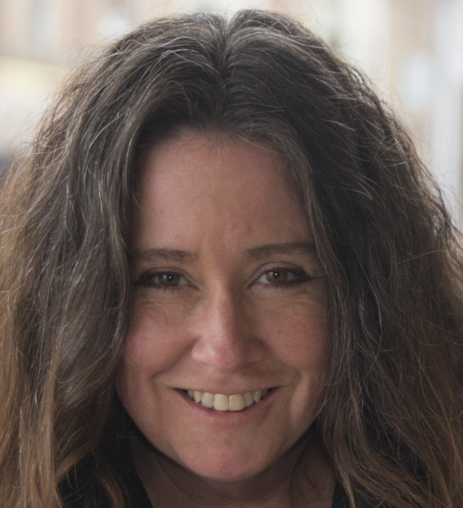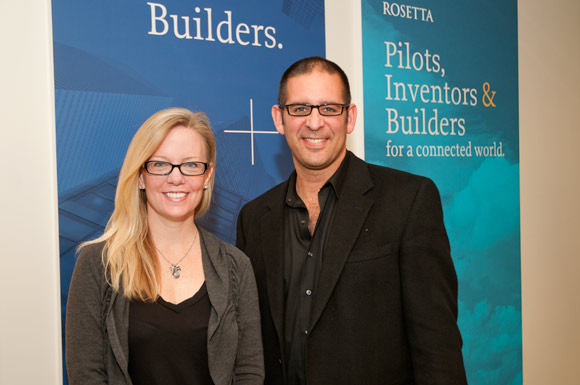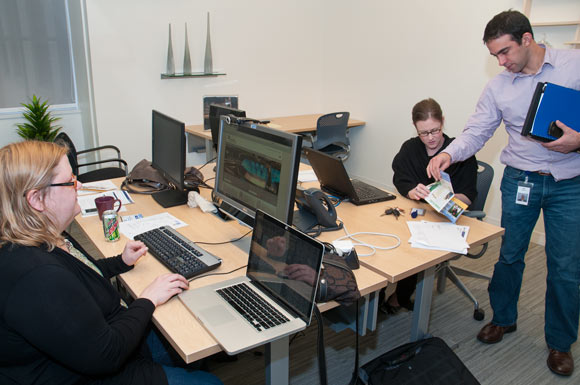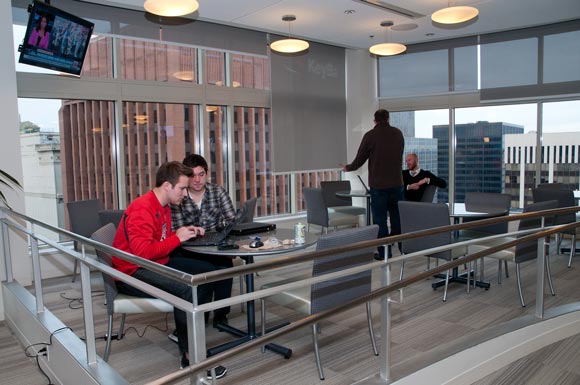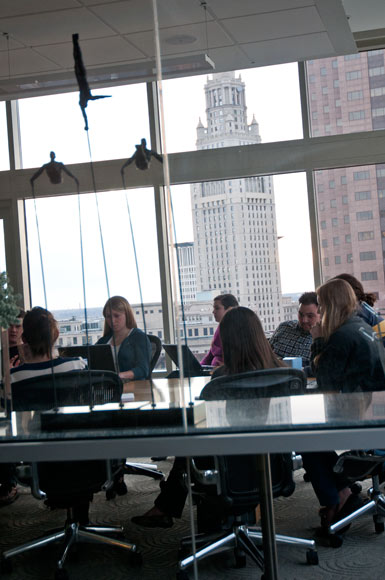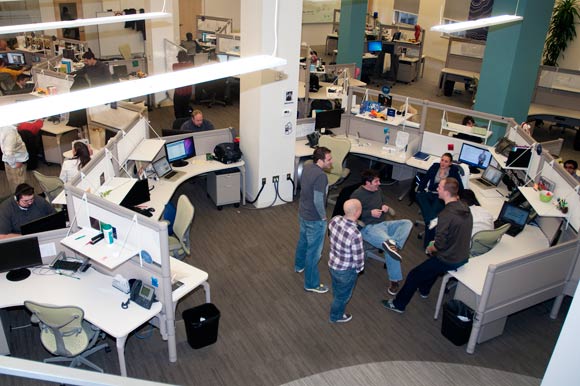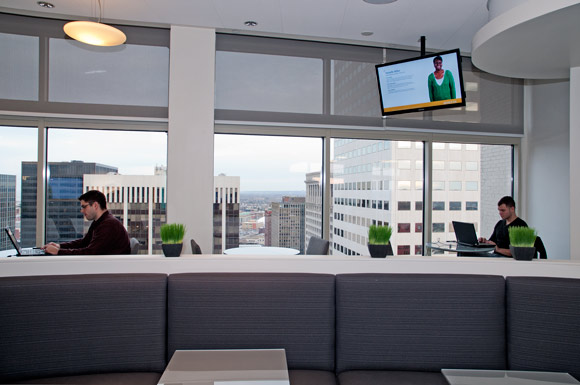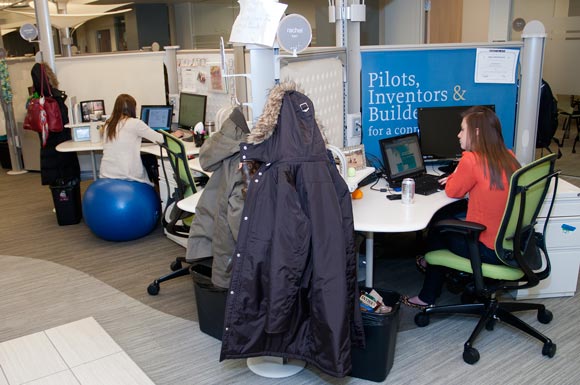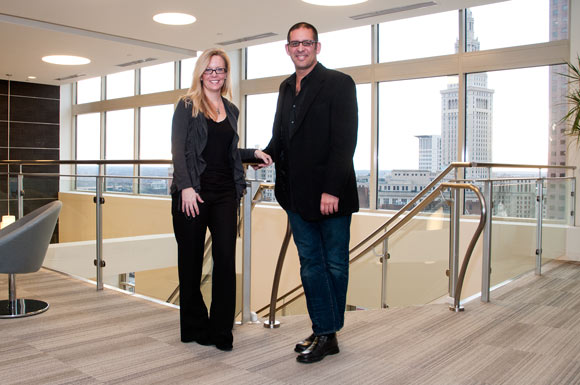great idea: rosetta pumps new life into an old downtown landmark
No matter how much retro chic oozes from Don Draper and Joan Harris of Mad Men fame as they roam the corridors of Sterling Cooper, their fictitious efforts are downright quaint when juxtaposed against the apps, search engine wars, and pixel-perfect designs that shape modern marketing campaigns.
Hence, the national firm Rosetta eschews the woefully inadequate label of "ad agency," choosing instead to bill itself as a group of creative technologists producing in a world of interactive marketing.
"We transform ideas and thoughts around consumers and their behaviors and then create an interactive experience," says associate partner Dave Fazekas, explaining how the firm brings a brand to life online.
Rosetta boasts 1,500 team members spread across nine offices in places like New York, Los Angeles and Toronto, among others. But thanks to 450 staffers locally, Cleveland is now Rosetta's largest.
That the firm has chosen 2012 to set-up shop in a downtown Cleveland landmark is pure poetry: a joyful tech rose blooming vibrantly in the center of the rust belt. Surprising? Not really; this agency has more than its share of deep, local roots.
In 1989, one Len Pagon founded New Media, a tiny start-up that helped local businesses develop a mysterious new tool called a "web page." By 2007, the firm had rebranded to Brulant and earned the #13 spot on Weatherhead's list of fastest growing companies. The following year, New Jersey-based Rosetta acquired Brulant. Up until last year, Rosetta's Cleveland offices were split between Beachwood and Independence. It was the refreshingly old fashioned concept of face-to-face time for both employee and client interactions that instigated the downtown consolidation.
"We really value employees," says Fazekas, who joined Rosetta in 2008. "By giving them a collaborative environment, it gives our people from the associate level on up an opportunity to grow beyond their title and their role."
"You can only accomplish so much over the phone," adds Rosetta partner Kate Clegg, who joined Brulant in 2004 before the acquisition. "You need to sit across from the people you're working so passionately for."
Add to that a dose of giving the people what they want and the downtown choice was obvious. More than 100 Rosetta staffers live downtown -- a staggering 22 percent. With upscale choices like the Bingham in the lively Warehouse District and The Residences at 668 hovering over frenetic East 4th Street, the central downtown location caters to the youthful Rosetta demographic both residentially and socially.
It works for more established team members as well.
"In high school, when they asked, 'What do you want to do when you grow up?'" recalls Fazekas, a Lorain native, "I said, I want to work in downtown Cleveland."
The location marries the best of the old with the best of the new. Built in 1896 and expanded in the 1920s, the National City Bank Building on the corner of Euclid and E. 6th is listed on the National Register of Historic Places. But history no longer impairs the sleek, modern look of Rosetta's 80,000-square-foot, six-floor office space.
"We basically gutted this entire place down to the bones," says Clegg.
Rosetta's high-tech "usability lab" will amaze even the least tech savvy among us. Here, paid participants act as would-be consumers while interacting with onscreen applications at a bank of computers. Cameras and electronics capture participants' every physical move, all the way down to individual keystrokes, cursor movements and even eye-gaze tracking.
"If we ask a participant to find a particular offer or do some type of command," says Clegg, "we can see where their eyes go first."
Two adjacent observation rooms allow staffers and clients to view it all through one-way mirrors as well as on monitors that reveal the tiniest details of how a user interacts with an online product.
"This is the most sophisticated lab in the country," says Clegg.
An entire wing is dedicated to optimizing online searches for Rosetta's eclectic client roster, which includes industry giants such as Microsoft, Disney and Pfizer. Probably not what architects Shepley, Rutan and Coolidge had in mind when they designed the original structure back in the 1890s. Back then, even uttering words like "google," "bing" or "yahoo" too frequently might have landed you in the booby hatch.
People-soft amenities include multiple kitchenettes -- here affectionately called "knuckles" -- shower facilities for freshening up post-workout or two-wheeled commute, and a dazzling penthouse lounge where air hockey and ping pong tournaments play out amid stunning views. An outdoor deck will soon be transformed into a rooftop patio.
"You'll be able to see the fireworks displays from the Indians games," says Clegg, "and we'll have tables out here where people can eat and enjoy the view."
Rosetta's professional focus is on the virtual world, but walking through these offices proves that the company thrives because of real people. Groups crowd each of the many conference and training rooms. Staffers huddle together over keyboards and screens. Every department is teeming with living, breathing people who make the virtual world come to life. The result? Rosetta crackles with energy.
That energy is bubbling over into the firm's new neighborhood. Now that the operation is wholly integrated with downtown in a physical sense, Rosetta aims to knit itself into the fabric of Cleveland in an altruistic sense.
Street-level initiatives include a holiday toy donation "Giving Tree" program, blood drive, and a hands-on push to upgrade the historic Hough Salvation Army Youth Center. The facility, built in the 1960s, is in dire need of an upgrade. To that end, new electronics and furniture are on the way courtesy of Rosetta staffers, who recently donned coveralls and brightened the interior with a fresh coat of paint.
"Our people are so amazing with their willingness to help," says Fazekas.
"It's more than just financial giving," adds Clegg. "It’s not just about writing a check."
In a broader citywide application, Rosetta is dipping its toes into endeavors like Ingenuity Fest, for which partner Mike Gustafson serves on the Board, and is donating marketing and advertising services to Minds Matter, which helps kids from low-income families find their way to college. Fazekas hopes to see these efforts expand and eventually include partnerships with other technology-oriented companies and organizations.
"Cleveland is severely lagging behind other cities on the technology side of business," says Fazekas. "We want to help get it from the Rust Belt to a more advanced view."
"For us," adds Clegg, "it's about developing talent and it's about giving back."
Photos Bob Perkoski
